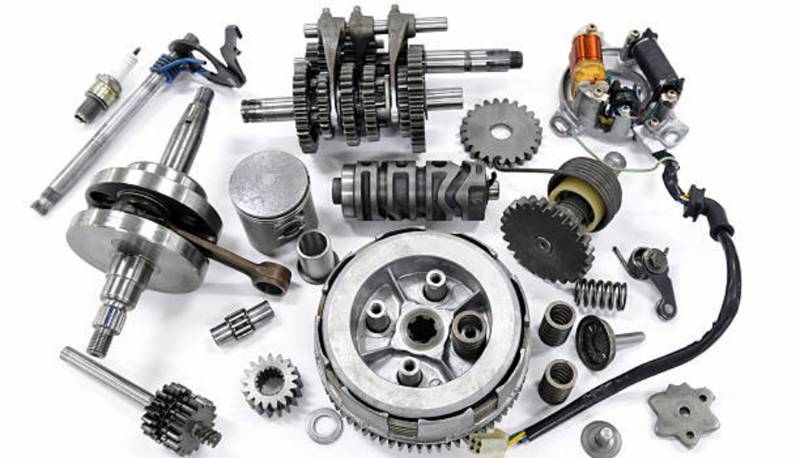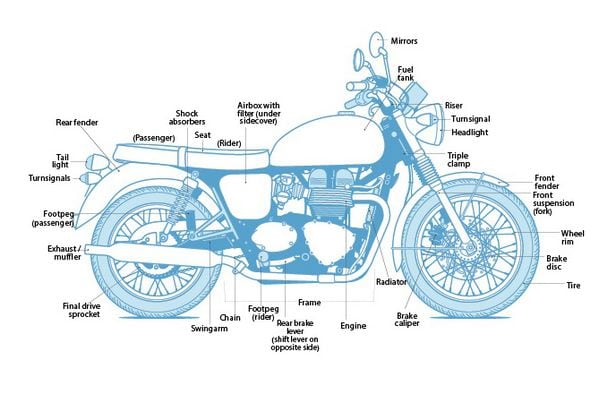Surprising Facts About Maintaining Bike Parts Wellington in Humid Climates
Surprising Facts About Maintaining Bike Parts Wellington in Humid Climates
Blog Article
Discover the Essential MotorBike Parts You Required for Ideal Efficiency
Comprehending the crucial parts of a motorbike is essential for accomplishing peak efficiency. Each part, from the engine to the braking system, plays a vital duty in overall functionality and security. Routine maintenance can protect against unanticipated failures and enhance the riding experience. Nonetheless, several cyclists overlook the complexities of these systems. Finding how they collaborate can cause an extra reliable experience. What critical elements should every rider prioritize?
The Engine: The Heart of Your Motorbike
The engine offers as the core part of a motorcycle, driving its performance and specifying its abilities. It is accountable for transforming gas into power, which powers the bike ahead. Various types of engines are employed, consisting of single-cylinder, V-twin, and inline setups, each offering unique characteristics suited for different riding purposes and styles. The engine size, generally measured in cubic centimeters (cc), considerably affects performance, with larger engines normally offering even more power and torque.Furthermore, the engine's style and innovation, such as gas shot systems or air-cooling versus liquid-cooling, affect performance and reliability. Maintenance is essential for peak procedure; aspects like routine oil adjustments and monitoring trigger plugs assurance longevity. Motorcyclists typically think about an engine's responsiveness and smoothness, as these attributes enhance the overall riding experience. Ultimately, the engine stays a crucial element that specifies not just the motorbike's performance however likewise the motorcyclist's link to the equipment.
The Transmission: Moving Gears Efficiently
The transmission plays a necessary duty in a motorcycle's performance, especially in the auto mechanics of gear moving. Comprehending just how to shift gears efficiently can boost the general riding experience, while normal maintenance assurances peak capability. Appropriate interest to these facets can substantially impact the longevity and effectiveness of the motorcycle.

Gear Shifting Mechanics
Smooth gear changing is necessary for optimal motorcycle performance, greatly impacting both acceleration and control. The mechanics of gear shifting include the interaction between the clutch, gear lever, and transmission system. When a cyclist involves the clutch, it disengages the engine from the transmission, enabling an equipment modification without damaging the components. A well-timed release of the clutch, combined with exact movement of the equipment bar, promotes a seamless modification between gears. This process assures that the engine operates within its best power band, boosting performance. Motorbike Components NZ. Furthermore, comprehending the gear proportions and their impact on speed and torque can assist cyclists make notified options during changes, ultimately adding to an extra delightful and receptive riding experience
Upkeep Tips Value
Regular maintenance plays an important role in assuring that the transmission system runs effectively, permitting for smooth equipment changes. Routinely inspecting and changing the transmission fluid is important, as old fluid can bring about increased rubbing and wear. Additionally, inspecting the clutch for wear guarantees peak involvement and disengagement, preventing slippage during gear adjustments. Lubrication of relocating components is equally important to lower friction and boost performance. Motorcycle owners ought to also check for leaks and unusual sounds, as these can indicate underlying concerns. By adhering to these upkeep suggestions, cyclists can extend the lifespan of their transmission system, assuring that equipment shifts continue to be smooth and adding to the total efficiency of their motorcycle.
The Braking System: Ensuring Safety And Security on Every Trip
Braking systems are basic elements that directly affect a motorcycle's safety and efficiency. They consist of various parts, including brake pads, blades, calipers, and hydraulic lines, all collaborating to assure efficient slowdown. The kind of braking system-- generally either disc or drum-- affects responsiveness and stopping power.Regular maintenance is necessary to promote peak efficiency; worn brake pads can cause reduced efficiency and boosted stopping ranges. Furthermore, the high quality of brake fluid should be kept track of, as it can absorb dampness with time, compromising braking efficiency.Riders need to also think about the importance of anti-lock stopping systems (ABDOMINAL), which prevent wheel lockup throughout abrupt quits, boosting general safety and security. Correctly working brakes are not nearly stopping; they impart self-confidence in the biker, enabling for more secure navigating with numerous terrains. Eventually, a dependable braking system is critical for delighting in every ride with satisfaction.
The Suspension: Enhancing Comfort and Control
A well-functioning shock absorber significantly adds to a motorcycle's overall efficiency, matching the performance of the stopping system. The suspension plays a significant duty in taking in shocks from unequal surfaces, ensuring a smoother adventure while preserving tire call with the road. This contact is necessary for both stability and control, permitting bikers to browse corners with confidence and precision.Different sorts of suspension systems, such as telescopic forks or mono-shocks, supply differing levels of convenience and handling. Properly tuned suspension boosts responsiveness, offering the cyclist with a much more connected feel to the motorbike. Regular upkeep checks are very important to identify the suspension elements, including springs and dampers, are operating at their finest. An efficient suspension system not only boosts the riding experience but also adds to the long life of various other motorcycle components by decreasing wear and tear. Therefore, investing in high quality suspension is essential for any significant motorbike fanatic.
The Tires: Linking You to the Road
Tires play an important role in a motorcycle's efficiency, working as the key link between the biker and the road. Recognizing the various types of tires readily available can substantially influence taking care of and security. Additionally, routine maintenance is crucial to guarantee peak tire efficiency and long life.
Tire Types Explained
How do various tire types affect a motorbike's efficiency? Tire kinds play a vital function in determining a motorbike's grasp, security, and handling. Sporting activity tires, designed for high efficiency, deal improved traction and responsiveness on smooth roads, making them ideal for competing and aggressive riding. Conversely, visiting tires prioritize longevity and comfort, providing a smoother experience for long-distance traveling. Off-road tires, defined by their tough walk patterns, master grip on unpaved surface areas, appropriate for experience lovers. In addition, dual-sport tires mix features from both on-road and off-road categories, dealing with functional riding requirements. Ultimately, choosing the ideal tire type is vital for maximizing performance, making certain safety and security, and boosting the general try this riding experience.
Upkeep Tips Offered
While riding when driving, preserving excellent tire problem is crucial for safety and performance. Frequently checking tire stress is essential, as under-inflated tires can lead to inadequate handling and boosted wear. It is recommended to examine walk deepness frequently; used tires concession grasp and stability. Additionally, bikers must search for signs of damage, such as cracks or bulges, which can show the need for substitute. Revolving tires occasionally guarantees even put on, improving long life. In addition, maintaining tires clean from particles and preventing excessive aesthetics can extend their lifespan. Keeping proper positioning and balance contributes to come to a head performance, minimizing stress and anxiety on other bike elements. Sticking to these upkeep tips will substantially boost the overall riding experience.
The Gas System: Sustaining Performance and Performance
The fuel system plays a crucial role in maximizing a motorcycle's efficiency and efficiency, as it guarantees the ideal shipment of fuel to the engine. It consists of numerous essential components, consisting of the gas storage tank, fuel pump, fuel filter, and fuel injectors or carburetor. Each component must work efficiently to ensure a effective and smooth ride.The fuel storage tank shops fuel and provides it to the engine by means of the gas pump, which creates the necessary stress. A gas filter prevents contaminants from going into the engine, while the injectors or carburetor mix gas with air for combustion.Proper upkeep of the gas system is vital; a stopped up filter or malfunctioning Our site injector can lead to reduced performance and boosted gas usage. By verifying that the fuel system operates effectively, riders can take pleasure in better throttle action, far better fuel economic climate, and on the whole boosted riding experience.
The Electrical System: Powering Your Adventure
An efficient electrical system is necessary for the overall functionality and safety and security of a motorbike, as it powers crucial components such as the ignition, lighting, and different digital systems. This system consists of the battery, which shops power, and the alternator, in charge of generating power while the engine runs. The electrical wiring harness attaches these components, making sure reputable power distribution.Additionally, merges safeguard the system from overloads, while relays help regulate high-current gadgets with low-power signals. A well-kept electrical system boosts efficiency by making sure smooth starts and regular operation of signals and lights, essential for biker exposure and safety.Regular checks of the battery's cost and connections are very important for avoiding electrical failures. Cyclists should likewise examine circuitry for damage, making certain all elements function preferably. Ultimately, a robust electric system adds considerably to the general performance and integrity of the motorbike.
Regularly Asked Questions
Just how Frequently Should I Change My Bike's Battery?
The frequency of bike battery replacement depends on use and maintenance (Bike Parts Wellington). Generally, batteries need to be replaced every 3 to five years. Routine checks can aid determine when a substitute is required for peak efficiency
What Tools Do I Required for Basic Motorbike Maintenance?
For basic motorcycle maintenance, one needs essential devices such as an outlet collection, wrenches, screwdrivers, pliers, tire stress gauge, and a torque wrench. These devices promote effective maintenance and guarantee the motorbike runs effectively and securely.
Exactly How Can I Boost My Bike's Aerodynamics?
To improve bike the rules of aerodynamics, one should think about adjusting fairings, utilizing windshield expansions, enhancing body placement, and minimizing general weight. These alterations assist minimize drag, improving security and fuel performance during adventures.
What Are the Indicators of a Failing Electric System?
Signs of a falling short electrical system consist of lowering lights, problem starting, uneven instrument readings, and blown integrates. Motorcycle Spares Christchurch. Uncommon smells or corrosion around battery terminals might additionally suggest underlying issues needing prompt interest for safety and efficiency

Just how Do I Select the Right Oil for My Bike?
When selecting oil for a motorcycle, one ought to think about the producer's specs, viscosity ratings, and the type of riding. Furthermore, standard versus artificial oil look at these guys can affect performance and engine defense, affecting the choice considerably. The engine size, typically measured in cubic centimeters (cc), significantly affects efficiency, with bigger engines generally offering even more power and torque.Furthermore, the engine's design and modern technology, such as fuel injection systems or air-cooling versus liquid-cooling, impact efficiency and integrity. A well-functioning suspension system considerably adds to a motorbike's general performance, complementing the efficiency of the braking system. The gas system plays a vital duty in making best use of a motorcycle's efficiency and effectiveness, as it assures the ideal distribution of gas to the engine. A fuel filter prevents pollutants from entering the engine, while the injectors or carburetor mix gas with air for combustion.Proper maintenance of the fuel system is important; a clogged up filter or malfunctioning injector can lead to reduced efficiency and increased fuel intake. A well-kept electrical system enhances performance by making certain smooth begins and constant operation of signals and lights, vital for rider visibility and safety.Regular checks of the battery's fee and connections are important for stopping electric failings.
Report this page